Scotland 'would keep pound' in years after independence
- Published
- comments
Nicola Sturgeon: Scottish currency 'entirely credible'
An independent Scotland would keep the pound for at least 10 years under proposals set out by the SNP's Growth Commission, external.
The country could potentially then move towards introducing its own currency if six economic tests were met.
The commission was set up two years ago to build a new economic case for independence following the Brexit vote.
Opposition parties say the SNP's pursuit of independence is doing nothing for Scotland's economy.
The 354-page analysis document - which has been billed as a "new case for optimism" - also says attracting more immigrants to Scotland is crucial.
Its aim is to "restart the debate" on independence, with the long-awaited report being discussed by special assemblies of SNP members around the country in the run-up to the party's autumn conference.
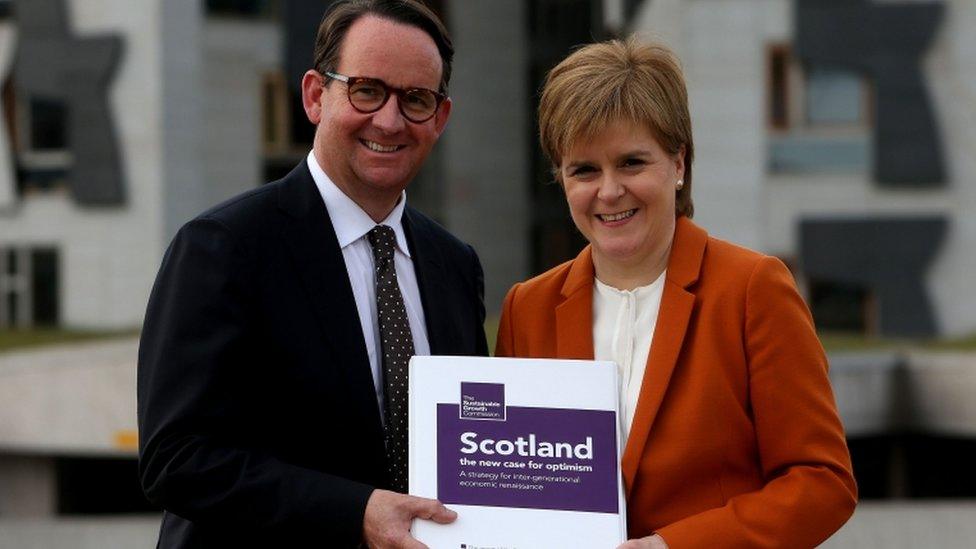
Andrew Wilson handed over the report to SNP leader Nicola Sturgeon earlier this week
But the commission also said many of the measures they were calling for could be implemented without independence.
And its author, former SNP MSP Andrew Wilson, stressed that independence was not a "magic wand", but would instead provide a "toolbox" that could help to grow the economy.
First Minister Nicola Sturgeon has pledged to set out her thinking on when there might be a second independence referendum in the autumn, once there is more clarity over Brexit.
What does the report say about currency?
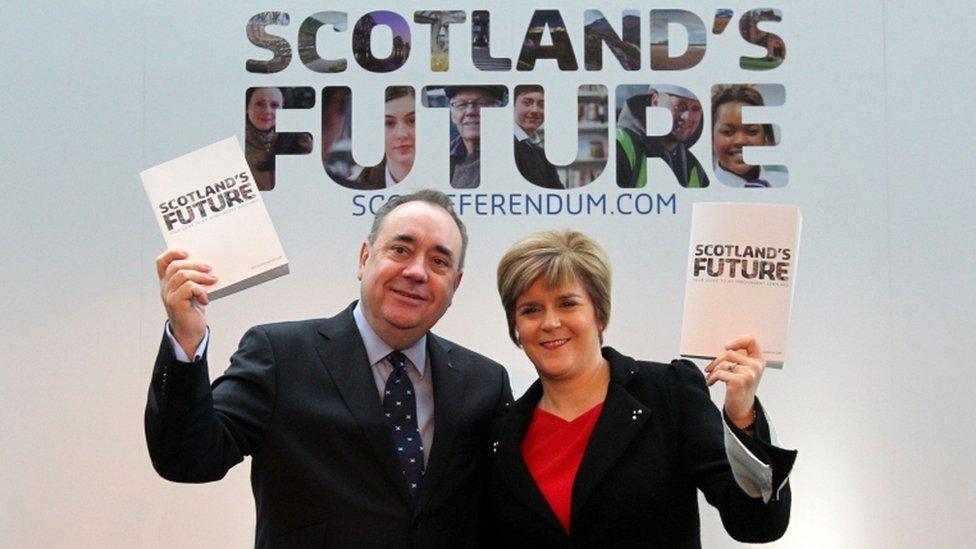
The Scottish government wanted a formal currency union with the rest of the UK if Scotland voted for independence in 2014
The commission says Scotland should keep sterling after independence, with the Bank of England continuing to set interest rates and other monetary policies.
But crucially, it says this would be done without a formal currency union between Scotland and the rest of the UK.
It also says that a "future choice to establish a Scottish currency could be considered" once the economy was "on track to the sustainable high-performance position our ambitions require".
But the report says that "unless those tests were met and a decision to change was made, our currency would remain the pound sterling".
Mr Wilson told BBC Scotland that sticking with the pound, at least initially, would offer "stability and certainty, and straight answers to hard questions for people about what happens to their pension or their mortgage".
He added: "We think the government should be focused on getting the economy growing, setting up the new country, getting the public finances stable and in order from where we inherit them" rather than on the "symbol" of a new currency.
How is this different from 2014?
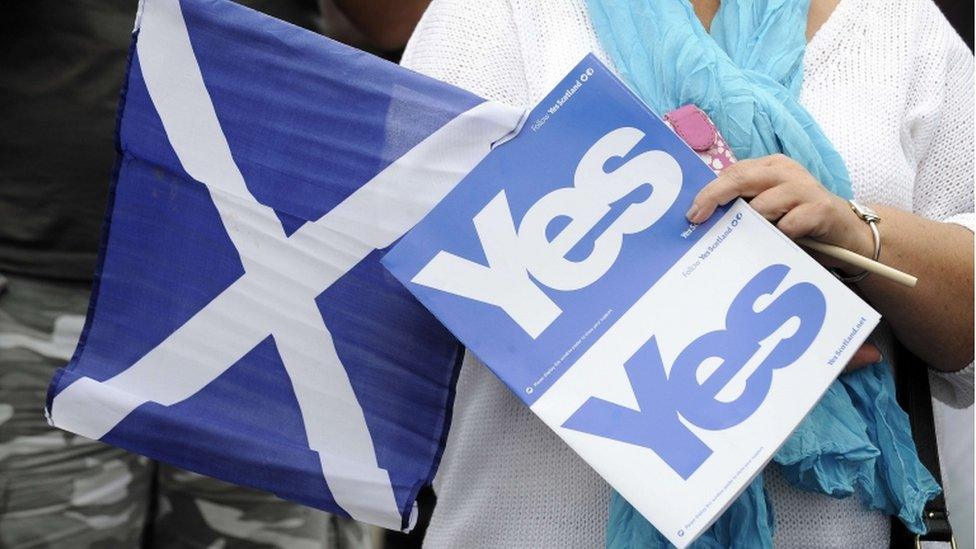
The SNP proposal ahead of the last independence referendum was for Scotland to continue using the pound through a formal currency union with the rest of the UK.
But the arrangement was ruled out by then-Chancellor George Osborne in a move that was widely seen as being a key factor in Yes losing the vote.
At the time, the Treasury's top civil servant, Sir Nicholas Macpherson "strongly" advised Mr Osborne against agreeing to the currency union proposal, which he said would have been "fraught with difficulty".
But the SNP argues that an independent Scotland would not need the permission of the UK government to continue using sterling.

Analysis by Sarah Smith, Scotland editor
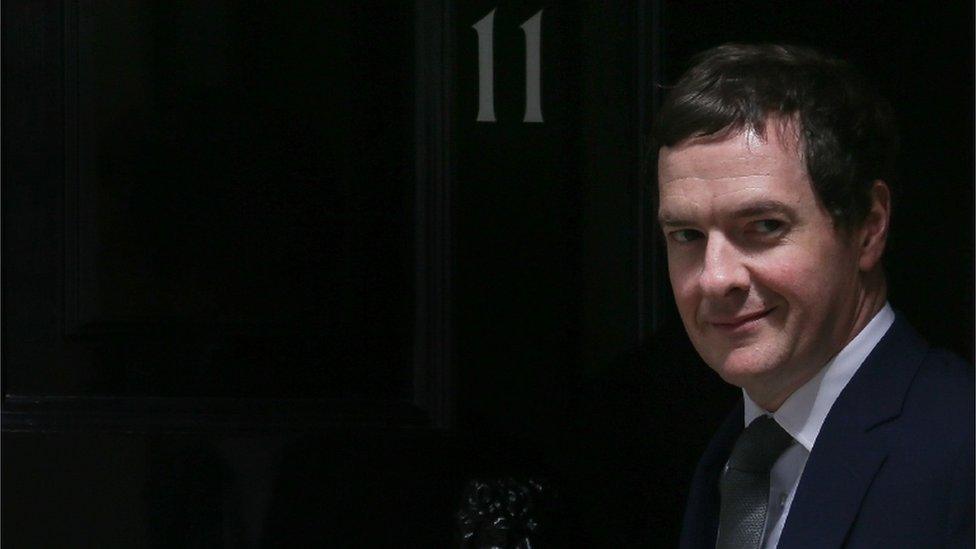
George Osborne ruled out a formal currency union ahead of the 2014 independence referendum
How does this get around the fact that if there were to be another independence referendum the UK government would almost certainly rule out, once again, a currency union?
Because they are no longer proposing a formal pact, and the UK government cannot stop Scotland simply using the pound.
But under those circumstances Scotland would have to accept monetary policy and interest rates set by the Bank of England without any concern for the economic circumstances in Scotland.
That doesn't sound like true "independence" will come the cry - both from those who oppose independence and from some die hard supporters who would like to see Scotland go the whole hog and create its own currency as a symbol of its new found sovereignty.
But the SNP think that's a price worth paying to answer one of the trickiest questions they faced repeatedly in 2014.

What else does the Growth Commission recommend?
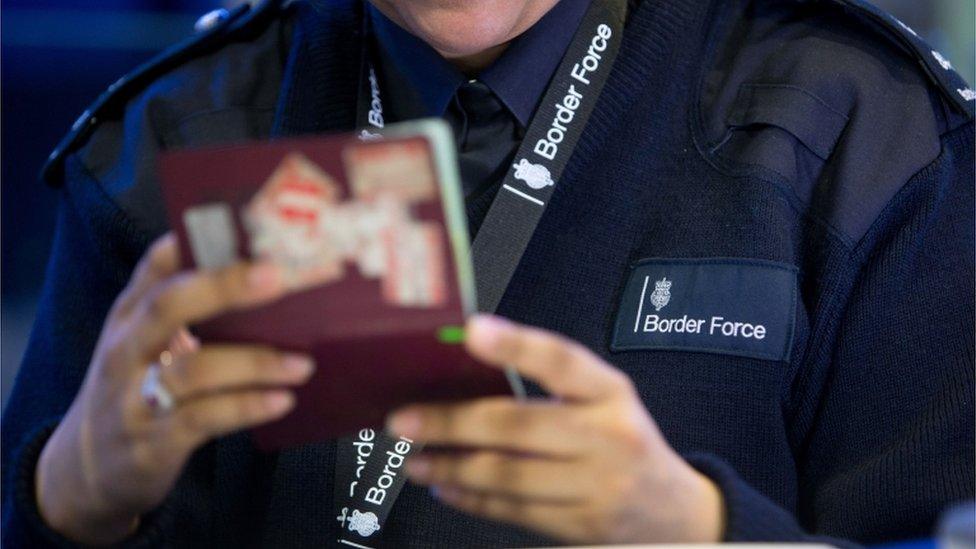
Mr Wilson fears current UK immigration policy could be damaging to Scotland
The report includes detailed plans to help fund continuing UK debt to promote "respect and good order" towards the rest of the United Kingdom.
Historic debts would fall to the rest of the UK - but Scotland would contribute about £5bn a year to meet debt commitments and fund international aid.
Mr Wilson studied 12 successful small countries around the world, with Denmark, Finland and New Zealand highlighted as examples to take lessons from.
The report sets out details of a "come to Scotland" campaign to drive immigration and population growth
This would include tax relief for highly skilled migrant workers to attract the "best and brightest" talent, measures to encourage international graduates to stay in Scotland, and a new visa system modelled on "the most efficient and easy to use in the world".
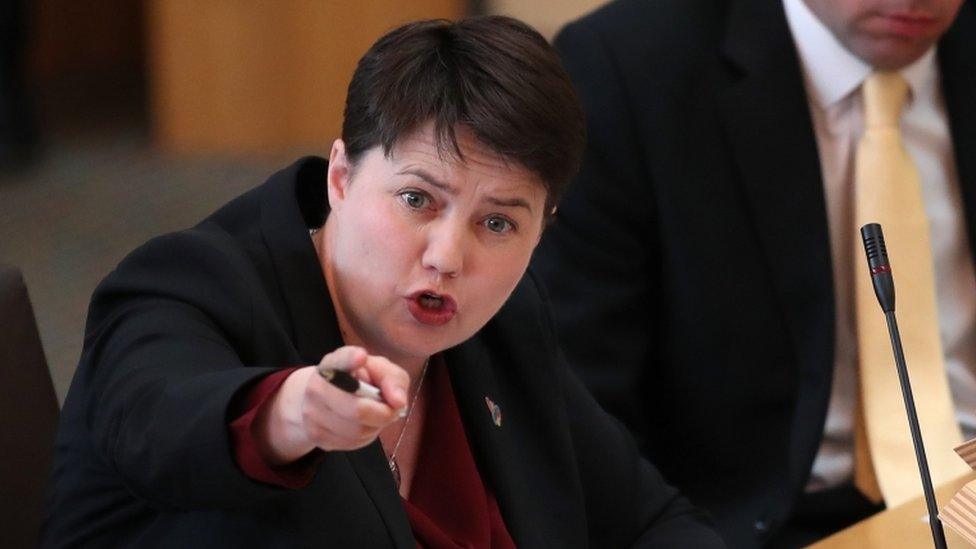
Ruth Davidson questioned whether Scots would be willing to "gamble their future" on the proposals
Mr Wilson warned of a "real danger" that current UK policies could see the working population fall, and said Scotland has a "great opportunity to strike a completely different tone".
The report also includes policy ideas to grow the economy through greater participation in the labour market and improved productivity.
But Mr Wilson said independence "must never be seen as a magic wand or quick and easy step to success" and that there was "no pot of gold, black or otherwise, at the foot of the independence rainbow".
Instead, he said independence would offer a "toolbox" that could be used to "create a stronger economy, sustainable public finances and a fairer society".
What has the reaction been?
Nicola Sturgeon, the SNP leader, said the report "rightly doesn't shy away from the challenges we face but presents ways in which those challenges can be addressed".
And she said she was "looking forward to debating the report's recommendations - both within the SNP and with business, trade unions and communities across Scotland."
Scottish Conservative leader Ruth Davidson said the SNP plan to retain sterling would leave an independent Scotland using "the currency of what would then be a foreign country without asking, without their own central bank and without any backstops".
She added that the plans for what would follow sterling were not clear, telling the BBC's World at One: "I'm not entirely sure that is enough for the people of Scotland to want to gamble their mortgage on, their pensions on, their wages on and their future on."
Scottish Labour leader Richard Leonard said the report was a "cuts commission" rather than a growth commission.
He added: "Proposals to cut Scotland's deficit by almost two thirds over a decade would result in a level of austerity that not even George Osborne attempted".
The pro-independence Scottish Greens said many of those who voted No in 2014 "will no doubt be open to the case for independence, especially when this report is compared to the bleak, post-Brexit economic analysis papers".
But Scottish Lib Dem leader Willie Rennie said there was "nothing hopeful or optimist about inflicting yet more division and economic risk on our country by separating us from the UK".